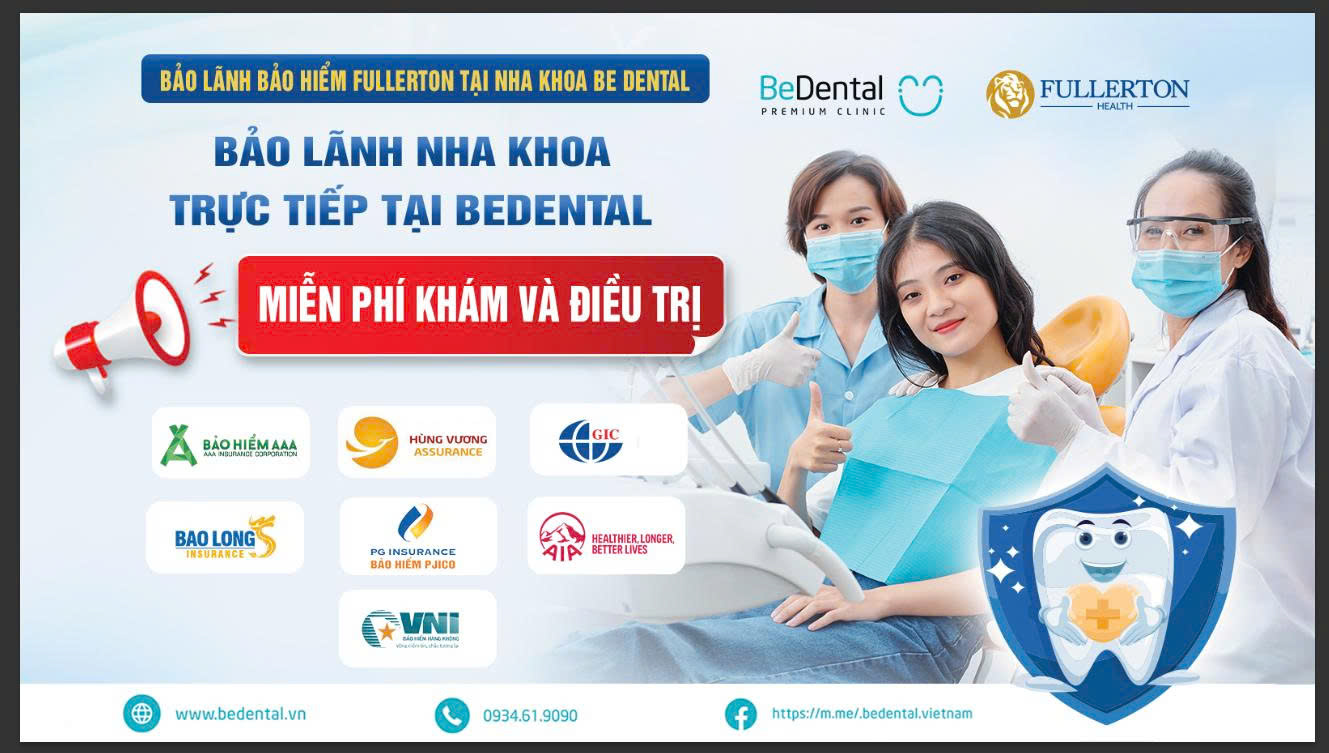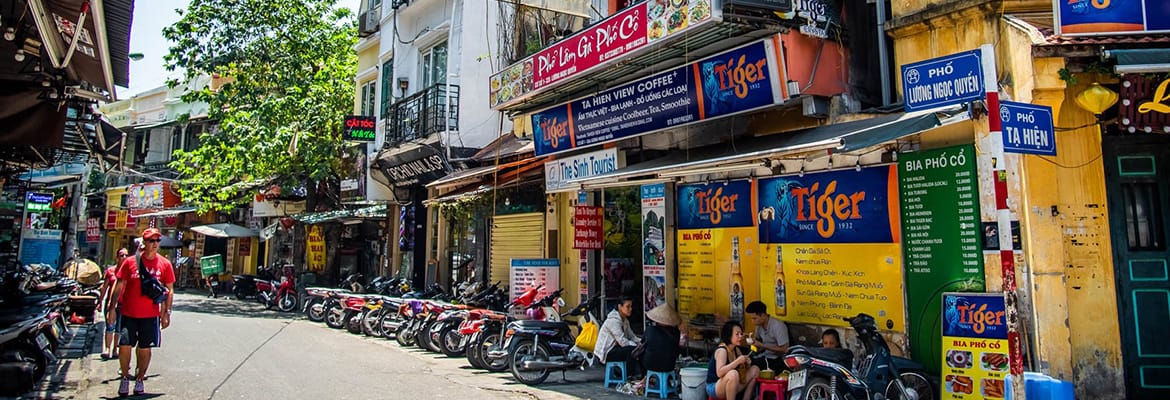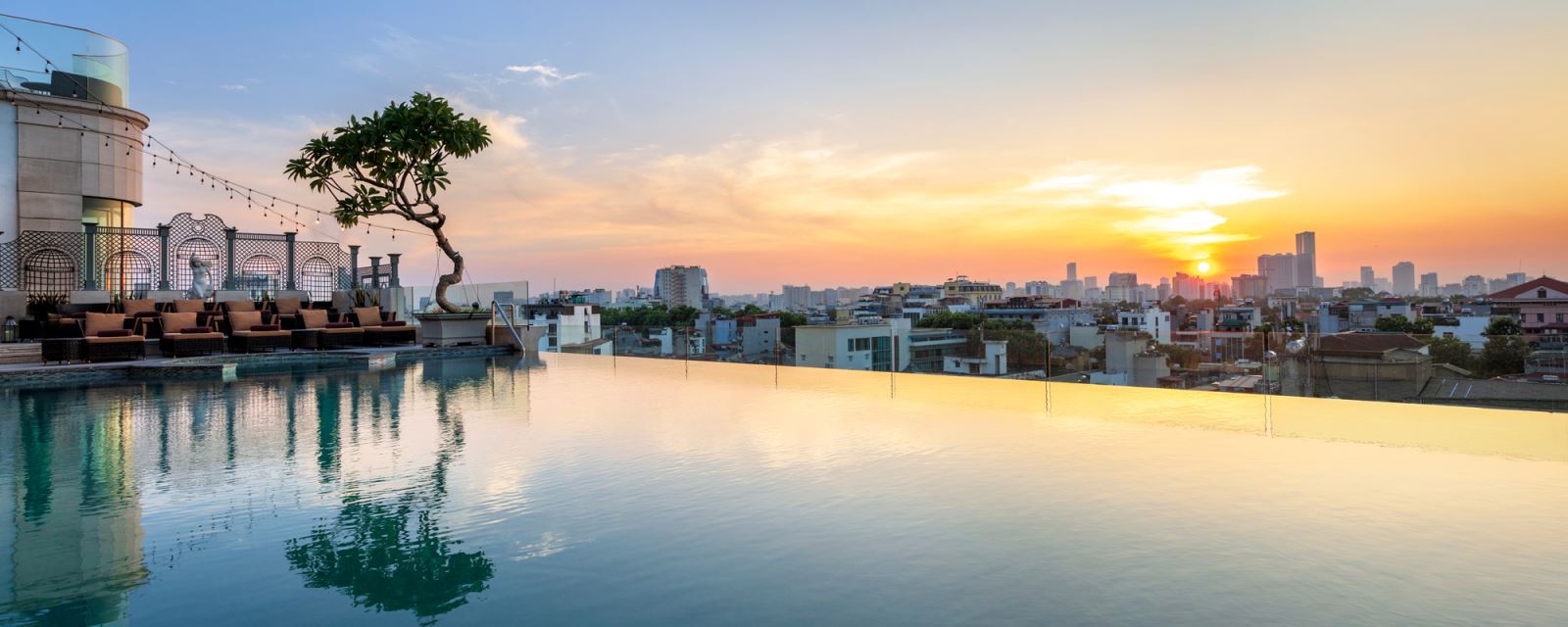How to deal with Vietnamese Police – How does the traffic police look like
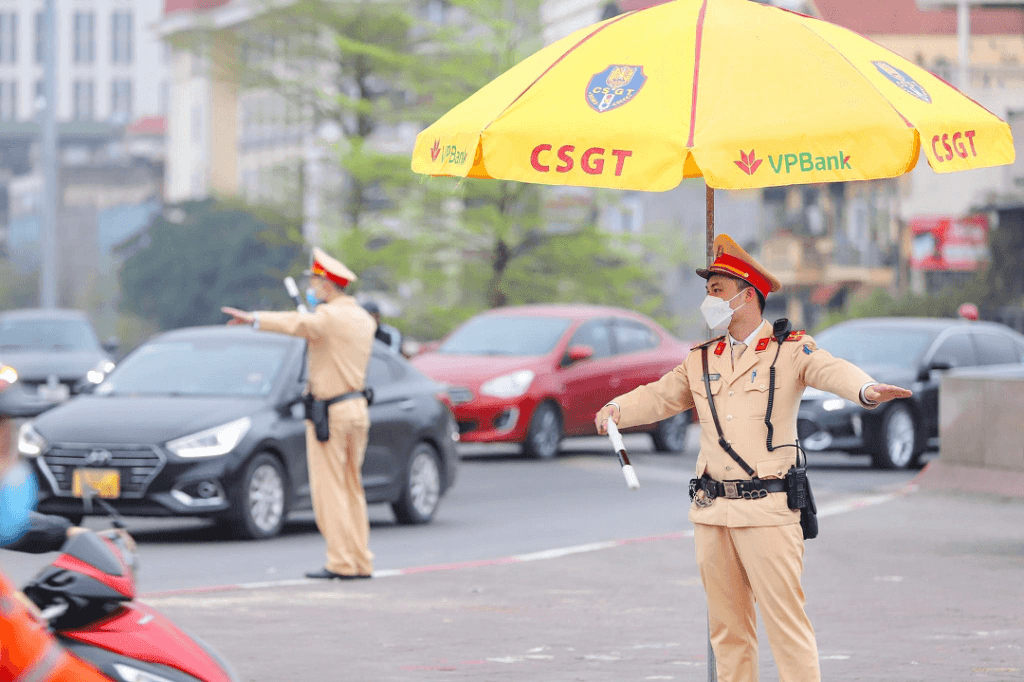
Let’s start by describing what the traffic police look like in Vietnam. They can be easily recognized by their yellow uniforms. In big cities, you’ll often come across multiple police stops and control points where they work diligently to maintain smooth traffic flow. Sometimes you’ll find them stationed in the middle of busy intersections, assisting with the orderly movement of vehicles. You can identify the traffic police by the acronym CSGT, which you’ll see on their vehicles, helmets, and checkpoint houses.
In urban areas, you’ll encounter various checkpoints where officers conduct document checks and pull over motorists. Their primary responsibility is to enforce traffic laws and ensure the safe flow of vehicles. However, it’s important to note that their authority is limited to these duties, as other types of police handle different responsibilities. Each police officer should have a blue ID card prominently displayed on the right side of their chest. This card contains their name, rank, number, and department. Just like in any country, if you happen to be stopped by the police, remember to take a photo or jot down the details from their ID card.
By familiarizing yourself with these aspects, you’ll be better prepared to navigate interactions with the traffic police during your motorbike adventure in Vietnam. Remember to always approach these situations with respect and follow the local laws to ensure a smooth and enjoyable journey.
How to deal with Vietnamese Police – Most Usual Cases Why People Get Pulled Over
There are several reasons why the police may pull people over in Vietnam, and I’ll explain the most common ones in a more relatable way:
- Not following traffic rules: This includes actions like running a red light, driving in the wrong direction, neglecting to use signals while making turns, or exceeding the speed limit. These violations can lead to fines. It’s essential to be aware of the consequences and adhere to the traffic rules to ensure your safety and the safety of others on the road.
- Regular traffic checks: The police often conduct these checks during rush hours in big cities when the roads are bustling with people. They randomly stop motorbike riders to inspect their vehicle documents and licenses. It’s crucial to have a valid Blue Card (registration) and an international or Vietnamese driving license. If you fail to present these documents, you might end up having to pay a fine, offer a bribe, or in some cases, they may even confiscate your motorbike.
- Tourist traps: Unfortunately, there are a few places where some police officers target tourists in an attempt to extract bribes from them. However, don’t worry too much about this as we’ll discuss how to avoid these situations later in the article. By staying vigilant and informed, you can easily navigate around these potential traps.
- Unfounded stops: Yes, it happens in Vietnam too! Sometimes, the police may stop you and claim you did something wrong when you didn’t. Their intention might be to extort money from you. While it’s frustrating, it’s important to handle these situations calmly and assert your rights. Remember, you’re not alone in experiencing this.
These four scenarios are the most common encounters you may have while driving around Vietnam. It might sound daunting, but fear not! With some knowledge and precautions, you can avoid many of these situations or navigate through them with minimal hassle. So, stay informed and confident as you embark on your motorbike adventure in Vietnam.
How to deal with Vietnamese Police – What to Do If You Get Pulled Over?
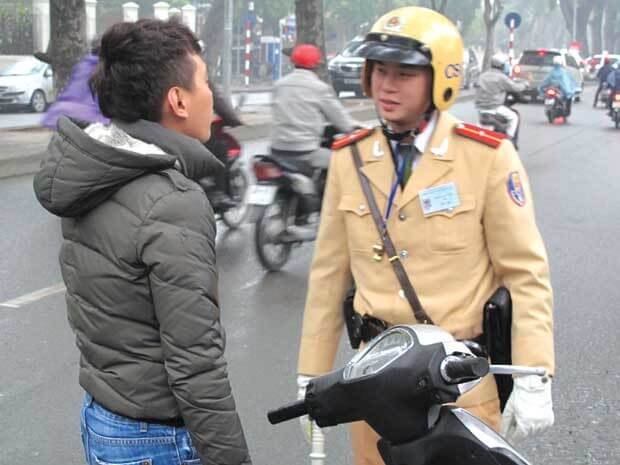
During our trip, our friend had the unfortunate experience of being pulled over by the police. However, luck was on his side as he was let go without any complications. We can definitely say he was a lucky guy!
Now, let’s delve into what happens and the process for travelers who aren’t as fortunate. Based on numerous stories and experiences shared by fellow travelers, regardless of the reason for being stopped by the police, there are a few possible scenarios.
When the police pull you over, they will typically ask for your documentation, including the blue card (registration) and driving license. In rural areas, if the police encounter a foreigner, they often just wave them through. This is because the language barrier can be a real challenge, and it would take a significant amount of time to extract money from foreigners. So, in these cases, they usually don’t bother.
However, if you don’t have the proper documents, they will request that you pay a fine (without issuing a ticket). Initially, they may start with a high amount, around 1 million Vietnamese Dong (VND). However, they usually settle for a significantly lower sum, such as 200k VND or even less.
This payment is essentially a bribe, and it’s often the easiest way to resolve the situation and avoid further complications. Paying the bribe allows you to bypass the entire ticketing process, which involves going to the police station, filling out forms, and ultimately paying a higher amount and wasting valuable time. If you find yourself unable to avoid spending money when encountering the police, paying the bribe may be the most pragmatic option.
Once you’ve settled everything with the officer, they will allow you to continue your journey. The process is generally straightforward and doesn’t take long if you’re randomly stopped by the police. However, if you happen to encounter a police trap, be prepared to pay a much higher amount without the possibility of negotiating the price. Additionally, in these traps, there is a significant risk that they may confiscate your motorbike.
While these situations can be disheartening, it’s important to stay calm and handle them with caution. Understanding the possibilities and being prepared can help you navigate through such encounters more effectively during your travels in Vietnam.
How to deal with Vietnamese Police – How to Deal with Police Traps
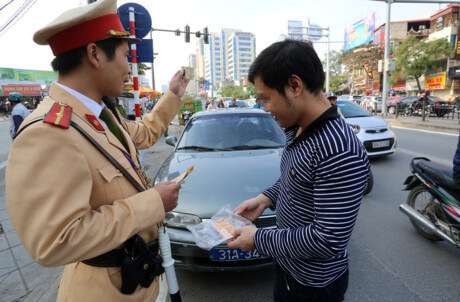
The best way to handle police traps is to avoid them altogether! Look for alternative routes that may be slightly longer but will ultimately save you both time and money. However, if you do find yourself stopped at a police trap, it’s important to understand the dynamics of the situation. Unfortunately, luck may not be on your side as these police officers are primarily focused on making money through bribes.
There’s a high likelihood that you’ll have to pay a substantial bribe to get out of the situation. But don’t lose hope just yet, as there are ways to minimize or even avoid paying any money at all.
First and foremost, ensure that you have a valid driving license and carry the appropriate blue card that matches your vehicle. Make sure you’re diligently following all the traffic rules, such as not speeding, wearing a helmet, and using signals when turning, among others.
If you’re confident that you haven’t done anything wrong and you have all the necessary documentation to legally drive in Vietnam, don’t panic. Start by trying to negotiate with the police officer. If that doesn’t yield the desired results, politely request a ticket.
The police might hesitate to issue one as it takes time, and they could potentially earn more money by not giving you a ticket. However, if they do write a ticket, be sure to note down all the relevant information from their uniforms. This information can be valuable later, especially if you have evidence to support your innocence.
Throughout the encounter, avoid speaking English if possible (especially if it’s not your native language). Alternatively, use an accent and respond with “I don’t understand” to everything they say. This tactic can be helpful in creating confusion and potentially defusing the situation.
The police officers may attempt to intimidate you with threats of tickets and discussions, but if they see that you’re confident and knowledgeable about their procedures, they may ultimately decide to let you go. It’s a strategy that has worked for many.
Remember, staying calm and composed is crucial during these encounters. By being prepared, assertive, and knowledgeable about your rights, you increase your chances of navigating through a police trap without having to pay a substantial bribe.
How to deal with Vietnamese Police – Tips to Successfully Dealing with Vietnamese Police
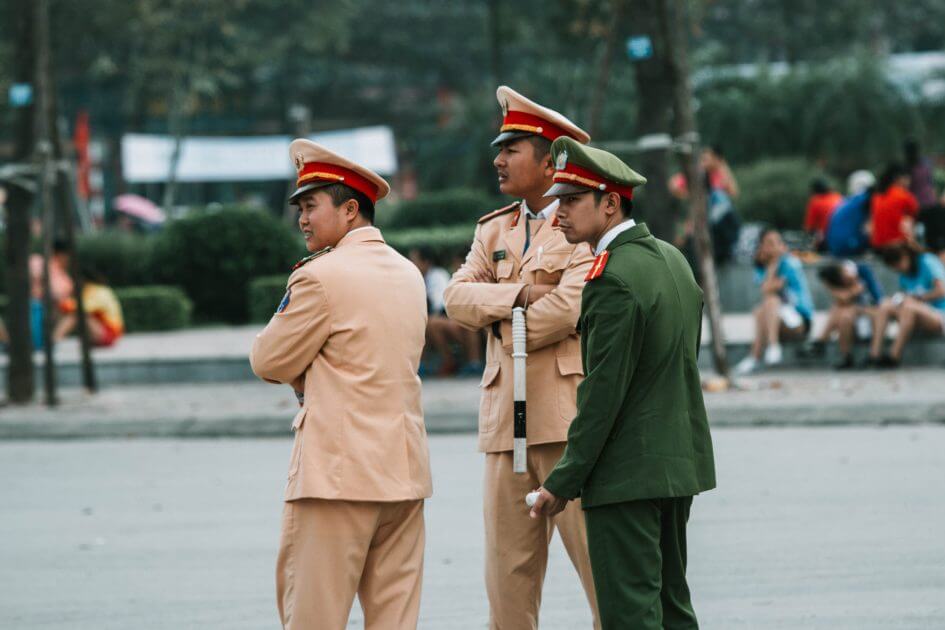
Getting pulled over by the police is something that can happen to anyone, and it’s not entirely within our control. However, being prepared with some tactics can significantly help in such situations, saving you both time and money. Here are some valuable tips we learned from our trip:
Carry two wallets. Hide your main wallet and keep another wallet with around 200k – 500k VND in it. It’s best to use this money for small purchases like gas or other items, so you have smaller bills. This will make your wallet appear more realistic than if you only had one large bill. If the police pull you over, you can simply state that it’s all the money you have, and they will usually accept it and let you go.
Always negotiate the price they initially quote you, as they often start with a high amount. However, they usually settle for around 200k VND.
If you don’t have all the necessary valid documents, it’s best to avoid receiving a ticket altogether. This way, you can be certain that you haven’t violated any traffic rules.
When pulled over, try speaking broken English or even better, use a different language if you can. Acting ignorant or confused if they speak English may prompt them to leave you alone, as they often don’t have the time or patience to deal with foreign travelers.
Wearing typical tourist attire can also be helpful in avoiding unnecessary attention. Most locals in traffic wear long sleeves to protect themselves from the sun, dust, and dirt.
We recommend wearing sunscreen and opting for a T-shirt and other tourist clothes. This way, the police will recognize you as a tourist and are less likely to stop you.
If a police officer waves their baton at you, you can simply drive away. If they start chasing you, stop and explain that you didn’t notice they were trying to pull you over, as the process may be different in your home country. Acting oblivious can sometimes work in your favor.
Conclusion
In conclusion, navigating interactions with Vietnamese police can be a daunting task, especially for foreigners. However, armed with the right knowledge and approach, it is possible to handle these encounters in a respectful and effective manner.
This article has provided a guide to dealing with Vietnamese authorities, offering valuable tips and insights to ensure a smooth experience. By understanding the local customs, laws, and procedures, individuals can better navigate situations involving the police and maintain a positive relationship with the authorities.
Remember, communication, patience, and respect are key when dealing with Vietnamese police. So, whether you are a tourist or an expat, refer back to this guide to confidently handle any encounters with Vietnamese authorities.
That’s it! By following these tips, you can significantly increase the chances of having successful encounters with the police.
Remember, dealing with traffic police is not a horror story. They generally don’t hassle foreign backpackers too much. However, if you do get pulled over, just utilize the tactics mentioned above and handle the situation calmly and confidently.



